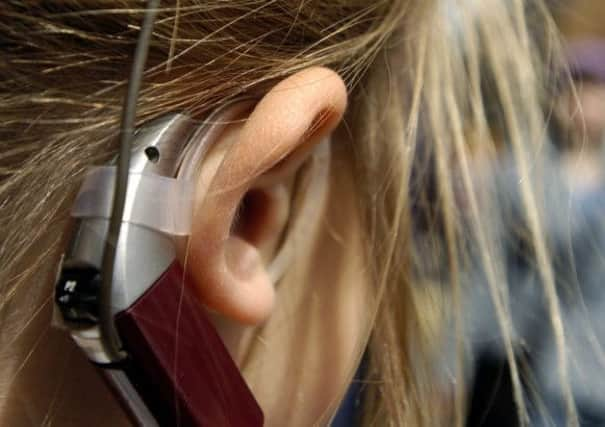Deaf Scots set to receive £3.2m investment boost


The programme will be rolled out from 2015/16 to ensure that those with cochlear implants benefit from any changes to sound processor technology every five years.
CONNECT WITH THE SCOTSMAN
• Subscribe to our daily newsletter (requires registration) and get the latest news, sport and business headlines delivered to your inbox every morning
Advertisement
Hide AdAdvertisement
Hide AdA cochlear implant is a surgically implanted electronic device that, in combination with a sound processor, provides a sense of sound and an understanding of speech, to a person who is profoundly deaf or severely hard of hearing.
Currently sound processors are replaced if they no longer work and cannot be repaired, or if the patient is judged to not receive sufficient clinical benefit from the device.
Health Secretary Shona Robison said the £3.2 million Scottish Government investment would improve patients’ quality of life.
She said: “This is a substantial investment in a small, specialised service which will make a real difference to those children and adults who rely on cochlear implants for a better quality of life.
“For children, especially young children, cochlear implants can give an understanding of sound that will help them develop speech and language skills that allow them to integrate into mainstream society.
“The technology in this area is developing all the time, with newer, better processors becoming available that can improve sound quality and the functionality of the device.
“It is only right that we give patients access to this life-changing technology and I’m extremely pleased to be able to announce the funding that will deliver a roll-out of this national five-year upgrade programme.”
In the UK, around one in every 1,000 children is severely or profoundly deaf at the age of three years old, the Scottish Government said.
Advertisement
Hide AdAdvertisement
Hide AdBy the age of 9-16 this rises to two in every 1,000, with genetic causes the reason in nearly half of childhood deafness cases.
The use of cochlear implants is also increasing among older people who develop age-related deafness as part of the ageing process.
Heather Gray, director of the National Deaf Children’s Society Scotland said: “This investment signals real commitment from the Scottish Government to ensuring the best possible outcomes for deaf children. Hundreds of children across the country rely on this specialist technology for access to sound which is fundamental to their learning and wellbeing. Ensuring this technology is working to its optimal capacity is critical.
“With the right support, we know that deaf children can achieve as much as their hearing peers.
“But the persisting education attainment gap for deaf children shows we still have much to do to ensure we are getting it right for this small, often overlooked group of children. This investment is a step towards closing the gap and is very welcomed.”
Catherine and Andrew Lothian, whose two year-old daughter Alice has a cochlear implant, welcomed the announcement.
They said: “We are delighted with this decision.
“It will make a big difference to Alice, two-and-a-half years old, as she will now be offered an upgrade every five years, which is the guaranteed lifespan of a cochlear implant processor.
“We now know that she will continue to receive the best available quality and clarity of sound, and will always have access to up-to-date technology as time goes on. That will have a positive impact for her in learning, hearing and socialising in a mainstream school.
Advertisement
Hide AdAdvertisement
Hide Ad“Alice’s confidence has increased since she has been ‘switched on’ and she loves listening to stories and dancing and singing. We’re delighted to know that she will be able to continue to enjoy these activities in the same way.
Scotland’s national Cochlear Implant Programme is based at Crosshouse Hospital in Kilmarnock.
SCOTSMAN TABLET AND IPHONE APPS